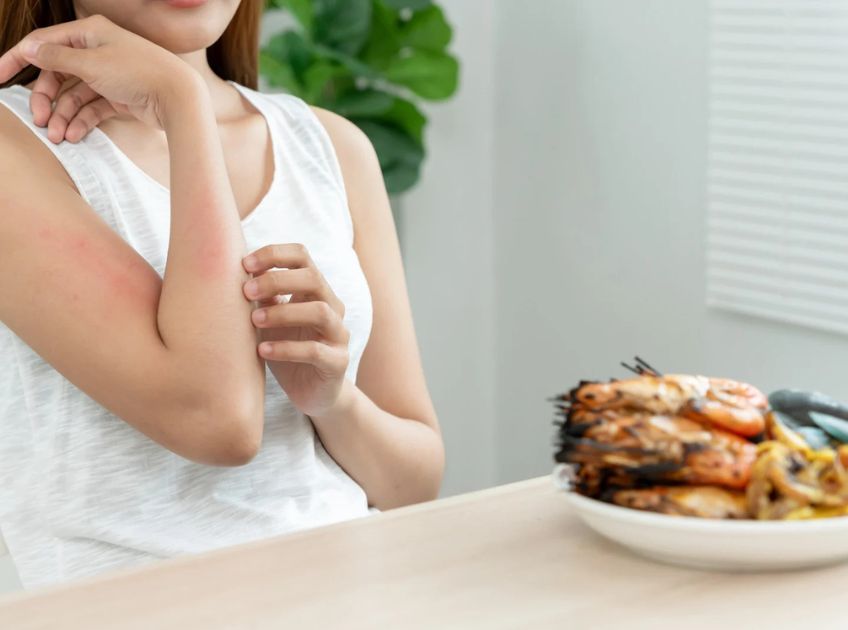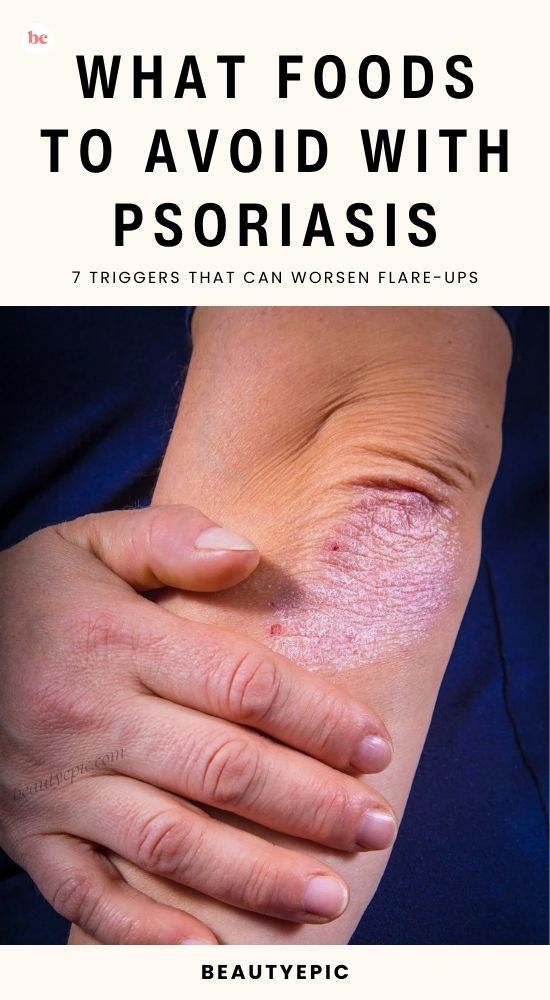
Important: This article is for informational purposes only. Please read our full disclaimer for more details.
Psoriasis is a chronic autoimmune skin condition characterized by itchy, inflamed, and scaly patches. While genetics and immune dysfunction play the primary role, research shows that dietary choices can influence flare-ups and symptom severity. Certain foods are known to promote inflammation, which may worsen psoriasis symptoms, while others help calm the immune response.
This guide breaks down the top foods to avoid, supportive alternatives, and other potential dietary triggers backed by science.
7 Common Foods That May Worsen Psoriasis
1. Red Meat – A Source of Inflammatory Compounds
Red meats such as beef, lamb, and pork are high in saturated fats and a fatty acid called arachidonic acid, which the body converts into pro-inflammatory molecules. This can intensify psoriasis-related inflammation. Processed meats like sausages, bacon, and hot dogs are even worse due to added nitrates and preservatives.
What studies say: Research published in the British Journal of Dermatology has linked high red meat consumption with systemic inflammation and worsening autoimmune conditions (1).
Better choice: Opt for lean protein sources like fish, lentils, or skinless poultry.
2. Dairy Products – Not Always Friendly to the Skin
Milk, cheese, butter, and cream are rich in saturated fat and casein, a milk protein that may stimulate inflammation in some individuals. Full-fat dairy also promotes higher insulin-like growth factor (IGF-1) levels, which may affect skin cell turnover. For some people, dairy sensitivity worsens flare-ups.
What studies say: A study in the Journal of the American Academy of Dermatology found that eliminating dairy improved skin conditions in sensitive individuals (2).
Better choice: Try plant-based alternatives such as almond milk, oat milk, or coconut yogurt.
3. Processed Foods – Inflammatory and Nutrient-Poor
Fast food, packaged snacks, chips, and ready-made frozen meals often contain refined sugars, unhealthy oils (trans fats, hydrogenated fats), and preservatives. These ingredients contribute to chronic inflammation, obesity, and poor gut health—all known to worsen psoriasis.
What studies say: Research in the Nutrients Journal highlights that diets high in ultra-processed foods are linked to higher inflammatory markers (3).
Better choice: Focus on whole, minimally processed foods like fresh fruits, vegetables, and homemade meals.
4. Gluten-Containing Grains – A Hidden Trigger for Some
While not everyone with psoriasis is sensitive to gluten, studies show that people with celiac disease or gluten sensitivity may notice improvements when eliminating wheat, barley, and rye. Gluten may stimulate immune activity and worsen psoriasis in predisposed individuals.
What studies say: A study published in Clinical and Experimental Dermatology found that psoriasis patients with gluten antibodies improved on a gluten-free diet (4).
Better choice: Try gluten-free grains such as quinoa, brown rice, millet, or oats (certified gluten-free).
5. Nightshade Vegetables – Potential Inflammation Culprits
Tomatoes, potatoes, peppers, and eggplants belong to the nightshade family and contain solanine, an alkaloid that may provoke inflammation in some people. While nutrient-rich, nightshades are worth monitoring if flare-ups seem worse after eating them.
What studies say: Although limited, anecdotal reports and elimination diets suggest some psoriasis patients benefit from avoiding nightshades (5).
Better choice: Replace with non-nightshade veggies like zucchini, carrots, and leafy greens.
6. Alcohol – A Common Flare-Up Trigger
Alcohol dilates blood vessels and can increase skin redness and irritation. It also weakens the immune system and may interfere with psoriasis medications, making them less effective. Heavy drinking is strongly linked to worsening psoriasis severity.
What studies say: According to the American Journal of Clinical Nutrition, alcohol consumption is a recognized trigger for flare-ups and poor treatment response in psoriasis patients (6).
Better choice: Limit or avoid alcohol, and replace it with sparkling water, kombucha, or herbal teas.
7. Sugary Foods & Beverages – Fuel for Inflammation
Sodas, candies, pastries, and other high-sugar items cause rapid blood sugar spikes, triggering the release of pro-inflammatory cytokines. Excess sugar also contributes to weight gain, which is a risk factor for psoriasis flare-ups.
What studies say: A review in JAMA Dermatology reported that high sugar intake contributes to systemic inflammation and worsens autoimmune conditions (7).
Better choice: Satisfy sweet cravings with antioxidant-rich fruits like berries, or small amounts of dark chocolate.
Foods That May Help Calm Psoriasis
While some foods aggravate symptoms, others provide anti-inflammatory benefits that may help ease discomfort:
- Fatty fish (salmon, mackerel, sardines): Rich in omega-3s that reduce inflammation.
- Leafy greens (kale, spinach): Packed with antioxidants and vitamins A, C, and K.
- Berries: High in polyphenols that fight oxidative stress.
- Olive oil & avocados: Healthy fats that support skin barrier function.
- Whole grains (oats, brown rice, quinoa): Provide fiber to regulate blood sugar.
Other Potential Triggers to Watch Out For
Every psoriasis case is unique, so some people may notice additional food triggers, such as:
- Spicy foods can worsen skin irritation in some.
- Citrus fruits (acidic reactions for sensitive individuals)
- Artificial additives like food colorings and preservatives
- Keeping a food journal can help identify personal triggers and patterns in flare-ups.
What Science Says About Psoriasis and Diet
A review published in the Journal of the American Academy of Dermatology suggests that anti-inflammatory diets rich in fruits, vegetables, and omega-3 fatty acids may improve psoriasis outcomes (8).
Another study in Dermatologic Therapy found that weight loss and reducing alcohol intake significantly reduced flare frequency (9). While diet isn’t a cure, it plays a key role in symptom management.
Frequently Asked Questions (FAQ’S)
Q1: Can going gluten-free help with psoriasis?
A. It may help if you have gluten sensitivity or celiac disease. A doctor can test for gluten antibodies before recommending a strict gluten-free diet.
Q2: Is coffee bad for psoriasis?
A. Coffee isn’t directly linked to worsening psoriasis, but excessive caffeine may contribute to stress and sleep issues, which can indirectly affect flare-ups.
Q3: Can diet alone cure psoriasis?
A. No, psoriasis is a chronic autoimmune condition. Diet can’t cure it, but it can help reduce inflammation, improve skin health, and minimize flare-ups alongside medical treatments.
Final Thoughts
Psoriasis management is holistic—it’s not only about medications but also about lifestyle and dietary patterns. Avoiding inflammatory foods like red meat, processed snacks, dairy, and alcohol while embracing nutrient-rich, anti-inflammatory options can make a significant difference in how you feel.
















